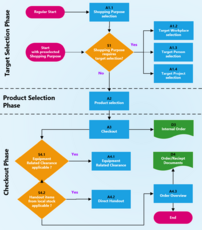Difference between revisions of "Internal order"
Stefanseiler (talk | contribs) |
Stefanseiler (talk | contribs) |
||
| Line 8: | Line 8: | ||
=== Product Selection === | === Product Selection === | ||
When a user enters the internal shop he by default starts in the [[Internal Shop - Regular product selection view|regular product selection view]], which allows to find products from the all the catalogs and put them into the shopping basket for the price which was proposed by the cheapest vendor available for this product. The user may also decide to switch to the [[Internal Shop - Assisted ordering|assisted ordering]] if he is eligible for using any [[ | When a user enters the internal shop he by default starts in the [[Internal Shop - Regular product selection view|regular product selection view]], which allows to find products from the all the catalogs and put them into the shopping basket for the price which was proposed by the cheapest vendor available for this product. The user may also decide to switch to the [[Internal Shop - Assisted ordering|assisted ordering]] if he is eligible for using any [[Shopping assistants|shopping assistants]]. ZUGSEIL offers a variety of shopping assistants by default, although the [[Dev:Personal equipment shopping assistant|personal equipment shopping assistant]] is the most widely used by companies equipping their employees. Other commonly used assistants are the [[Dev:Project equipment list shopping assistant|project equipment list shopping assistant]] or the [[Dev:Workplace equipment list shopping assistant|workplace equipment list shopping assistant]]. | ||
Revision as of 05:09, 21 June 2022
Internal ordering means the process of employees filing their demand on items required for their work (e.g. for c-parts). Typical products for this process are tools, personal protective equipment (ppe) or corporate wear.
Fundamental process
The fundamental process is very similar to the regular ecommerce process known from any ecommerce shop vendor. When the user starts the internal ordering process, the first step is to select products. After the products are selected, the user has to check out. After checkout has been finished successfully, the order is either passed to fulfillment processes or, if the user has permission hand out items from local stock, the ordered items might be handed out by the user to the ordering party(s) for which the order was placed.
Product Selection
When a user enters the internal shop he by default starts in the regular product selection view, which allows to find products from the all the catalogs and put them into the shopping basket for the price which was proposed by the cheapest vendor available for this product. The user may also decide to switch to the assisted ordering if he is eligible for using any shopping assistants. ZUGSEIL offers a variety of shopping assistants by default, although the personal equipment shopping assistant is the most widely used by companies equipping their employees. Other commonly used assistants are the project equipment list shopping assistant or the workplace equipment list shopping assistant.
For filing the demand to the company ZUGSEIL offers two core process paths:
- Regular ordering - the standard process. Select from a list of products offered through internal catalogs.
- Assisted ordering - the enhanced process. Reduced list of products by rules defined by the organization or by artificial intelligence. Goal is to reduce the complexity of the process, to speed it up and simplify it. Goal is to reduce the time invest for internal ordering to the minimum.
Payment of internal ordering
Depending on the type of equipment and the usage scenarios ZUGSEIL offers these types of payment:
Fulfillment of internal orders
Once the demand is filed, companies have two decide between two core fulfillment strategies:
- stock fulfillment - means the fastest availability of goods. Downsides are capital binding, warehousing and disposition planning costs.
- On demand purchasing - means slower availability and direct dependency on supplliers. Benefit is the reducion of warehousing cost. Capital binding and disposition planning can be negotiated with the suppliers.
General Process Flow
- Ordering
- "AdHoc purchasing" vs "Local Fulfillment"
Process "Just in time ordering"
Gathering and grouping of demand
Clearance process
Purchaing with supplier
Fulfillment
Billling
Process "Local Warehousing"
Problems
Maverick buying
distributed clearance process require process guidance - especially material clearance
Combination of "Just in time process vs. bulk ordering
warehousing in bulk ordering
